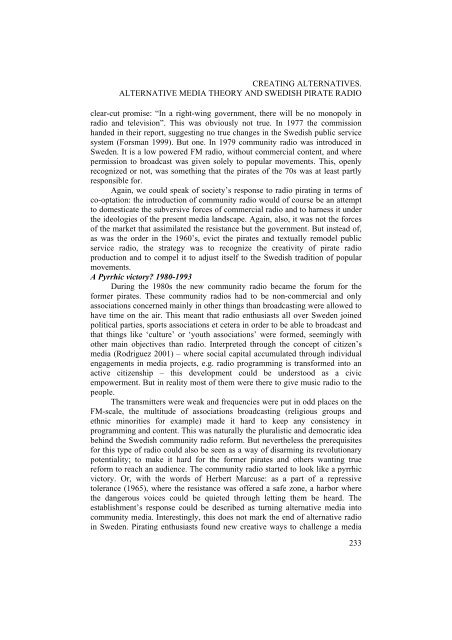culture, subculture and counterculture - Facultatea de Litere
culture, subculture and counterculture - Facultatea de Litere
culture, subculture and counterculture - Facultatea de Litere
You also want an ePaper? Increase the reach of your titles
YUMPU automatically turns print PDFs into web optimized ePapers that Google loves.
CREATING ALTERNATIVES.<br />
ALTERNATIVE MEDIA THEORY AND SWEDISH PIRATE RADIO<br />
clear-cut promise: “In a right-wing government, there will be no monopoly in<br />
radio <strong>and</strong> television”. This was obviously not true. In 1977 the commission<br />
h<strong>and</strong>ed in their report, suggesting no true changes in the Swedish public service<br />
system (Forsman 1999). But one. In 1979 community radio was introduced in<br />
Swe<strong>de</strong>n. It is a low powered FM radio, without commercial content, <strong>and</strong> where<br />
permission to broadcast was given solely to popular movements. This, openly<br />
recognized or not, was something that the pirates of the 70s was at least partly<br />
responsible for.<br />
Again, we could speak of society’s response to radio pirating in terms of<br />
co-optation: the introduction of community radio would of course be an attempt<br />
to domesticate the subversive forces of commercial radio <strong>and</strong> to harness it un<strong>de</strong>r<br />
the i<strong>de</strong>ologies of the present media l<strong>and</strong>scape. Again, also, it was not the forces<br />
of the market that assimilated the resistance but the government. But instead of,<br />
as was the or<strong>de</strong>r in the 1960’s, evict the pirates <strong>and</strong> textually remo<strong>de</strong>l public<br />
service radio, the strategy was to recognize the creativity of pirate radio<br />
production <strong>and</strong> to compel it to adjust itself to the Swedish tradition of popular<br />
movements.<br />
A Pyrrhic victory? 1980-1993<br />
During the 1980s the new community radio became the forum for the<br />
former pirates. These community radios had to be non-commercial <strong>and</strong> only<br />
associations concerned mainly in other things than broadcasting were allowed to<br />
have time on the air. This meant that radio enthusiasts all over Swe<strong>de</strong>n joined<br />
political parties, sports associations et cetera in or<strong>de</strong>r to be able to broadcast <strong>and</strong><br />
that things like ‘<strong>culture</strong>’ or ‘youth associations’ were formed, seemingly with<br />
other main objectives than radio. Interpreted through the concept of citizen’s<br />
media (Rodriguez 2001) – where social capital accumulated through individual<br />
engagements in media projects, e.g. radio programming is transformed into an<br />
active citizenship – this <strong>de</strong>velopment could be un<strong>de</strong>rstood as a civic<br />
empowerment. But in reality most of them were there to give music radio to the<br />
people.<br />
The transmitters were weak <strong>and</strong> frequencies were put in odd places on the<br />
FM-scale, the multitu<strong>de</strong> of associations broadcasting (religious groups <strong>and</strong><br />
ethnic minorities for example) ma<strong>de</strong> it hard to keep any consistency in<br />
programming <strong>and</strong> content. This was naturally the pluralistic <strong>and</strong> <strong>de</strong>mocratic i<strong>de</strong>a<br />
behind the Swedish community radio reform. But nevertheless the prerequisites<br />
for this type of radio could also be seen as a way of disarming its revolutionary<br />
potentiality; to make it hard for the former pirates <strong>and</strong> others wanting true<br />
reform to reach an audience. The community radio started to look like a pyrrhic<br />
victory. Or, with the words of Herbert Marcuse: as a part of a repressive<br />
tolerance (1965), where the resistance was offered a safe zone, a harbor where<br />
the dangerous voices could be quieted through letting them be heard. The<br />
establishment’s response could be <strong>de</strong>scribed as turning alternative media into<br />
community media. Interestingly, this does not mark the end of alternative radio<br />
in Swe<strong>de</strong>n. Pirating enthusiasts found new creative ways to challenge a media<br />
233












